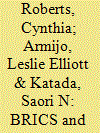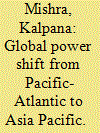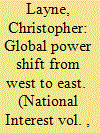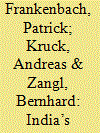| Srl | Item |
| 1 |
ID:
169767


|
|
|
|
|
| Publication |
New York, Oxford University Press, 2018.
|
| Description |
xix, 260p.: figures, tablespbk
|
| Standard Number |
9780190697525
|
|
|
|
|
|
|
|
|
|
|
|
Copies: C:1/I:0,R:0,Q:0
Circulation
| Accession# | Call# | Current Location | Status | Policy | Location |
| 059790 | 337/ROB 059790 | Main | On Shelf | General | |
|
|
|
|
| 2 |
ID:
151133


|
|
|
|
|
| Summary/Abstract |
Global power shifts are strategically and politically significant. It tends to displace or restructure existing international order. The global strategic, political and financial structures have been dominated by the U.S. and Europe. Asia remained dominated by European colonization for two centuries and was there after dominated by the U.S. strategically for one more century. Asia’s economic resurgence and cumulative financial strengths over the last two decades have substantially contributed to the global shift of power to Asia.
|
|
|
|
|
|
|
|
|
|
|
|
|
|
|
|
| 3 |
ID:
113131


|
|
|
|
|
| Publication |
2012.
|
| Summary/Abstract |
WHEN GREAT powers begin to experience erosion in their global standing, their leaders inevitably strike a pose of denial. At the dawn of the twentieth century, as British leaders dimly discerned such an erosion in their country's global dominance, the great diplomat Lord Salisbury issued a gloomy rumination that captured at once both the inevitability of decline and the denial of it. "Whatever happens will be for the worse," he declared. "Therefore it is our interest that as little should happen as possible." Of course, one element of decline was the country's diminishing ability to influence how much or how little actually happened.
|
|
|
|
|
|
|
|
|
|
|
|
|
|
|
|
| 4 |
ID:
181663


|
|
|
|
|
| Summary/Abstract |
In the mid-2000s, India turned from a nuclear pariah of the international community into a de facto recognized nuclear power. Why and how did this status elevation come about? Realist, liberal, and constructivist perspectives point to important motivations but fail to elucidate the process of India’s (re-)integration. Our strategic cooptation argument conceives of India’s status upgrade as an exchange of institutional privileges for institutional support. To stabilize the nuclear non-proliferation regime, the United States and other nuclear powers offered India the privilege of being recognized as nuclear power—and of taking part in international nuclear trade—in return for India’s promise to provide additional support to the non-proliferation regime. This deal materialized because India was able and willing to provide the needed support and because the institutional setting provided favorable conditions for circumventing and overcoming third-party resistance. We thus establish “strategic cooptation” as a mode of adapting international security institutions.
|
|
|
|
|
|
|
|
|
|
|
|
|
|
|
|